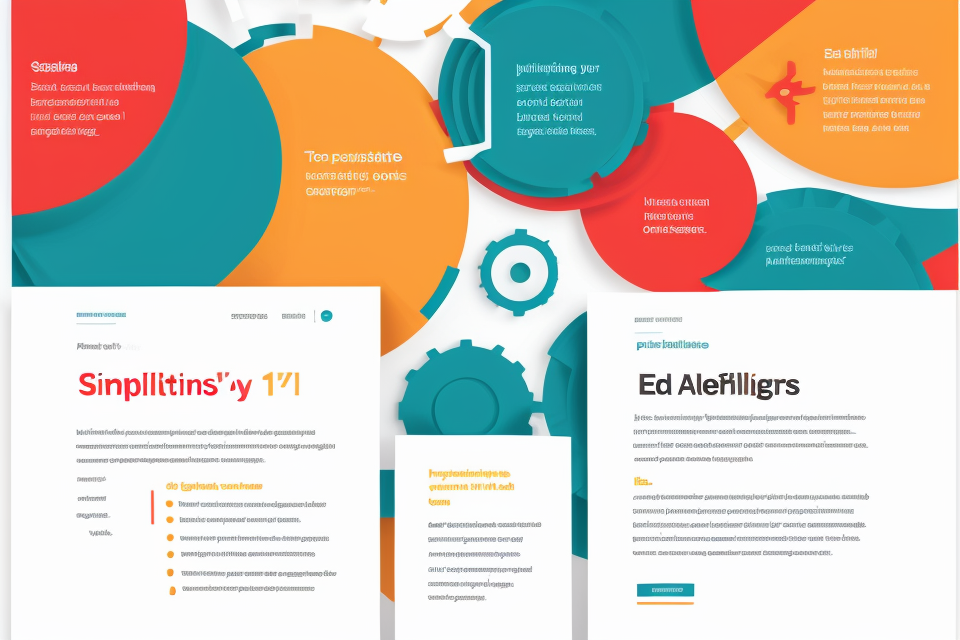
Is your computer running slower than usual? Are you looking for a solution to speed it up without breaking the bank? Look no further! In this article, we will explore the best free programs that can help you boost your computer’s performance. From cleaning up junk files to optimizing your system, these programs are easy to use and can make a significant difference in your computer’s speed. So, let’s dive in and discover the top free programs that can help you get your computer running like new again!
The best free program to speed up your computer is CCleaner. It is a popular system optimization and cleaning tool that can help improve your computer’s performance by removing unnecessary files and registry entries, clearing temporary files, and optimizing system settings. It is easy to use and offers a variety of customization options to suit your specific needs. Additionally, it is regularly updated to ensure compatibility with the latest operating systems and software. Overall, CCleaner is a reliable and effective solution for improving your computer’s speed and performance.
Understanding Computer Performance
Factors Affecting Computer Performance
There are several factors that can affect the performance of a computer. Understanding these factors can help you identify the cause of slow performance and take the necessary steps to speed up your computer. Here are some of the most common factors that can affect computer performance:
Hardware
The hardware of a computer includes the physical components such as the processor, memory, hard drive, and graphics card. These components can become outdated or worn out over time, leading to slower performance. Upgrading or replacing these components can help improve the speed of your computer.
Software
The software installed on your computer can also affect its performance. Some software programs can be resource-intensive and slow down your computer. It is important to uninstall any unnecessary software programs and update the ones that are essential to ensure optimal performance.
Operating System
The operating system (OS) of a computer is responsible for managing the hardware and software resources. A outdated or inefficient OS can lead to slow performance. Keeping your OS up to date with the latest updates and patches can help improve the speed of your computer.
User-generated content
User-generated content includes files such as documents, images, and videos that are stored on your computer. These files can take up a significant amount of space on your hard drive, leading to slower performance. Regularly deleting unnecessary files and organizing your files can help improve the speed of your computer.
Overall, understanding the factors that affect computer performance is crucial in identifying the cause of slow performance and taking the necessary steps to speed up your computer. By upgrading hardware, uninstalling unnecessary software, updating your OS, and organizing your files, you can improve the speed and performance of your computer.
Measuring Computer Performance
When it comes to optimizing your computer’s performance, it’s important to have a good understanding of how it’s currently functioning. Measuring your computer’s performance can help you identify areas that need improvement and track the effectiveness of any optimization measures you take. In this section, we’ll discuss two key methods for measuring computer performance: benchmarking and system monitoring tools.
Benchmarking
Benchmarking is a process of comparing your computer’s performance to similar systems. This can help you identify how well your computer is performing relative to others and whether there are any specific areas where it may be underperforming. There are several free benchmarking tools available online, such as SiSoftware Sandra and Geekbench, which can provide detailed information about your computer’s performance in various areas, including CPU, memory, and graphics.
System Monitoring Tools
System monitoring tools provide real-time information about your computer’s performance, including CPU usage, memory usage, disk activity, and network activity. These tools can help you identify performance bottlenecks and identify areas where your computer may be running slowly. Some popular system monitoring tools include CPU-Z, GPU-Z, and Task Manager.
In addition to these tools, there are also several free performance testing programs available, such as MemTest86 and Prime95, which can help you identify and diagnose specific performance issues. By using a combination of these tools, you can get a comprehensive understanding of your computer’s performance and identify areas where you can optimize it for better overall performance.
Identifying Slow Computer Performance
Common Symptoms of a Slow Computer
One of the most common symptoms of a slow computer is lagging during startup. This can manifest as a prolonged period of time between pressing the power button and the computer actually starting up. This can be caused by a variety of factors, such as a lack of available memory or a corrupted operating system.
Another symptom of a slow computer is longer application load times. This means that when you try to open a program or file, it takes longer than usual for it to load. This can be frustrating when you’re trying to get work done, and can even cause programs to crash or freeze.
Web browsing can also be sluggish on a slow computer. This means that when you’re trying to browse the internet, the pages may take longer to load, and may be slower to respond to user input. This can make it difficult to browse the web efficiently, and can be a major hindrance to productivity.
A delayed response to user input is another common symptom of a slow computer. This means that when you’re using the computer, the mouse or keyboard may not respond as quickly as they normally would. This can make it difficult to complete tasks, and can be a major source of frustration.
Overall, these common symptoms of a slow computer can significantly impact your ability to use your computer efficiently. It’s important to be able to identify these symptoms in order to determine the best course of action to speed up your computer.
Diagnosing Slow Computer Performance
Diagnosing slow computer performance is a crucial step in identifying the root cause of the problem. By running system diagnostic tools, checking disk usage, and reviewing software and browser settings, you can identify the cause of the slowdown and take steps to address it.
Running System Diagnostic Tools
System diagnostic tools are designed to test and diagnose problems with your computer’s hardware and software. These tools can help identify issues such as missing or corrupt drivers, outdated system files, and hardware failures. Windows has built-in diagnostic tools such as the Memory Diagnostic Tool, the Disk Defragmenter, and the System File Checker. These tools can be accessed through the Windows Control Panel or by typing the tool’s name into the Windows search bar.
Checking Disk Usage and Disk Cleanup
Over time, your computer’s hard drive can become cluttered with temporary files, cached data, and other unnecessary files. This clutter can slow down your computer’s performance and cause it to run slower than it should. To address this issue, you can use the Disk Cleanup tool in Windows to remove unnecessary files from your hard drive. This tool can be accessed through the Windows Control Panel or by typing “Disk Cleanup” into the Windows search bar.
Reviewing Software and Browser Settings
Outdated or unnecessary software and browser extensions can also slow down your computer’s performance. To address this issue, you can review your software and browser settings to identify and remove any programs or extensions that are no longer needed or that are causing problems. In addition, you can review your computer’s startup programs to identify any programs that are set to run automatically when you start your computer. These programs can slow down your computer’s startup time and overall performance.
Evaluating Free Programs to Speed Up Your Computer
Popular Free Programs for Improving Computer Performance
CCleaner
CCleaner is a widely-used free program designed to optimize your computer’s performance by removing unnecessary files and temporary data that can slow down your system. It can scan your computer for unwanted files, such as cookies, browsing history, and temporary files, and delete them to free up space and improve your computer’s speed.
Advanced SystemCare Free
Advanced SystemCare Free is a comprehensive program that offers a range of tools to optimize your computer’s performance. It includes features such as disk cleanup, registry cleanup, and startup optimization, which can help speed up your computer by removing unnecessary files and improving system performance. Additionally, it can also protect your computer from malware and other threats.
Auslogics BoostSpeed
Auslogics BoostSpeed is a popular free program that is designed to optimize your computer’s performance by cleaning up your system and removing unnecessary files. It includes features such as disk cleanup, registry cleanup, and startup optimization, which can help speed up your computer by removing unnecessary files and improving system performance. It also includes a number of additional tools, such as a disk defragmenter and a memory optimizer, which can further improve your computer’s speed.
Glary Utilities
Glary Utilities is a collection of system utilities that can help optimize your computer’s performance. It includes a range of tools, such as a disk cleanup, registry cleanup, and startup optimization, which can help speed up your computer by removing unnecessary files and improving system performance. Additionally, it also includes a number of other useful tools, such as a file shredder, a network tool, and a password manager.
Wise Disk Cleaner
Wise Disk Cleaner is a free program that is designed to optimize your computer’s performance by cleaning up your system and removing unnecessary files. It includes features such as disk cleanup, registry cleanup, and startup optimization, which can help speed up your computer by removing unnecessary files and improving system performance. Additionally, it also includes a number of other useful tools, such as a file shredder and a drive eraser, which can further improve your computer’s speed and security.
Criteria for Evaluating Free Programs
When searching for the best free program to speed up your computer, it is important to consider several key criteria to ensure that the program is both safe and effective. The following are some of the most important factors to consider when evaluating free programs:
Safety and Security
When it comes to speeding up your computer, it is essential to choose a program that does not compromise your system’s safety and security. Look for programs that have been thoroughly tested and have a proven track record of not causing any harm to your computer. Additionally, make sure that the program does not contain any malware or spyware that could potentially harm your system.
Features and Functionality
Another important factor to consider when evaluating free programs is their features and functionality. Look for programs that offer a range of tools and options to help speed up your computer, such as disk cleanup, startup optimization, and task management. Additionally, consider the ease of use and whether the program is user-friendly.
User Interface and Usability
The user interface and usability of a program are also important factors to consider. Look for programs with a clean and intuitive design that is easy to navigate. Additionally, consider whether the program offers helpful tutorials or guides to assist with using the program effectively.
System Compatibility
Finally, it is important to consider whether the program is compatible with your operating system and other software on your computer. Look for programs that are compatible with the most recent versions of Windows and other operating systems, and that do not conflict with other software on your computer.
Comparing Free Programs for Speed and Performance
When it comes to finding the best free program to speed up your computer, it’s important to compare different options based on their performance metrics and user reviews. Here are some factors to consider:
- Performance Metrics: One way to compare the performance of different free programs is to look at their system requirements. For example, some programs may require more RAM or processing power than others, which could impact their overall speed and performance. Additionally, you may want to consider the program’s interface and ease of use, as well as any additional features or tools it offers.
- User Reviews and Ratings: Another important factor to consider is the feedback and ratings from other users. Look for programs that have a high number of positive reviews and ratings, as well as a large user base. This can indicate that the program is effective and well-liked by users.
Overall, when comparing free programs for speed and performance, it’s important to evaluate each option based on its own merits and limitations. By considering factors such as system requirements, interface, and user reviews, you can make an informed decision about which program is best suited to your needs.
Making the Best Choice for Your Computer
Factors to Consider
When selecting the best free program to speed up your computer, it is important to consider several factors that will impact your decision. Here are some of the most important factors to keep in mind:
Your computer’s specifications and capabilities
One of the most important factors to consider is your computer’s specifications and capabilities. This includes the processor speed, amount of RAM, and storage capacity. If your computer has a slower processor or less RAM, it may not be able to handle more resource-intensive programs. Therefore, it is important to choose a program that is compatible with your computer’s specifications.
Your performance goals and priorities
Another important factor to consider is your performance goals and priorities. For example, if you are looking to improve your computer’s overall performance, you may want to choose a program that optimizes system settings and improves boot time. On the other hand, if you are specifically looking to improve your computer’s speed for gaming or other specific tasks, you may want to choose a program that is geared towards those needs.
Your comfort level with the program’s features and functionality
Finally, it is important to consider your comfort level with the program’s features and functionality. Some programs may have a steep learning curve or be more complex to use than others. If you are not comfortable with the program’s features and functionality, it may be more difficult to use and may not provide the desired results. Therefore, it is important to choose a program that is user-friendly and easy to use.
Selecting the Best Free Program for Your Needs
When it comes to selecting the best free program to speed up your computer, there are several factors to consider. By carefully evaluating these factors, you can make an informed decision that aligns with your goals and preferences.
Compare program features and performance
One of the most important factors to consider when selecting a free program to speed up your computer is the program’s features and performance. Make sure to compare different programs to determine which one offers the most comprehensive set of features that align with your needs. Consider factors such as startup optimization, disk cleanup, and task management.
Consider user reviews and ratings
Another important factor to consider is the program’s reputation among users. By reading user reviews and ratings, you can gain insight into the program’s effectiveness and user satisfaction. Pay attention to both positive and negative feedback to get a well-rounded understanding of the program’s strengths and weaknesses.
Evaluate the program’s impact on your system’s security and stability
It’s also important to consider the potential impact of the program on your system’s security and stability. Some programs may come with risks such as malware or spyware, while others may cause instability or conflict with other programs on your system. Be sure to research the program’s reputation and read reviews to ensure it is safe and reliable.
Choose the program that best aligns with your goals and preferences
Ultimately, the best free program to speed up your computer is the one that best aligns with your goals and preferences. Consider factors such as ease of use, customization options, and compatibility with your operating system and other programs on your system. Take the time to research and compare different programs to find the one that best meets your needs.
FAQs
1. What is the best free program to speed up my computer?
There are several free programs that can help speed up your computer. One of the most popular ones is CCleaner, which is a system optimization and cleaning tool that can remove unnecessary files and improve your computer’s performance. Another good option is Advanced SystemCare, which offers a range of tools to optimize, clean, and protect your computer.
2. How do these programs work to speed up my computer?
These programs work by removing unnecessary files and optimizing your computer’s settings. For example, CCleaner can remove temporary files, cache, and cookies that are no longer needed, which can help free up space and improve performance. Advanced SystemCare can optimize your computer’s settings, clean up your registry, and remove malware and other threats that can slow down your computer.
3. Are these programs safe to use?
Yes, these programs are generally safe to use. However, it’s always a good idea to scan your computer with an antivirus program before and after using any system optimization or cleaning tools to ensure that your computer is free of malware and other threats.
4. Can these programs cause any problems with my computer?
If you use these programs correctly and follow the instructions carefully, they should not cause any problems with your computer. However, it’s always a good idea to backup your important data before using any system optimization or cleaning tools, just in case something goes wrong.
5. Which program is better, CCleaner or Advanced SystemCare?
Both CCleaner and Advanced SystemCare are good programs that can help speed up your computer. The choice between them depends on your specific needs and preferences. CCleaner is a simpler program that focuses on removing unnecessary files and optimizing your computer’s performance, while Advanced SystemCare offers a wider range of tools to optimize, clean, and protect your computer. Ultimately, the best program for you will depend on your specific needs and preferences.


